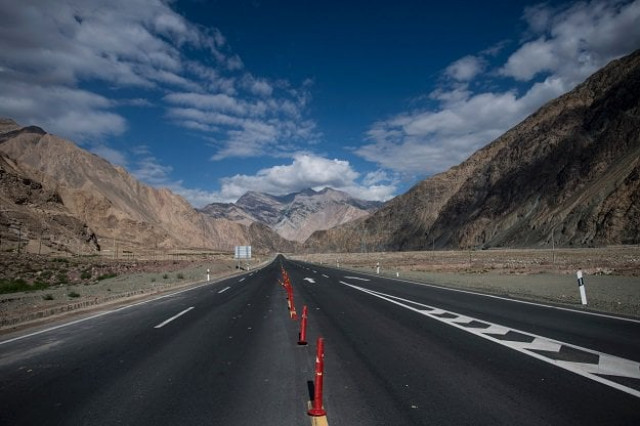CPEC need not be a zero-sum game for the US
It is also possible for the US to align itself with the CPEC initiative via green technology investments

An AFP file photo of a CPEC project.
We have recently prepared a white paper, “Leveraging the Moment of Change: Pathways to a Sustainable US-Pakistan Relationship”, which is a consensus document signed by leading experts on Pakistan within Washington DC. This paper has put forth policy recommendations to improve bilateral ties and place them on a surer footing, without undermining the national interests of either country.
Negotiating ties between Pakistan and the US has become increasingly complex with the changing scope of US regional commitments in South Asia over the past two decades. Besides the post-9/11 US military intervention in Afghanistan placing immense strain on its relationship with Pakistan, the US has enhanced the scope of its relationship with India. Conversely, now China also has a more serious role to play in the South Asian region, especially in Pakistan, due to its ambitious Belt and Road Initiative (BRI).
The China-Pakistan Economic Corridor (CPEC), a vital part of BRI, is still being viewed with suspicion by US policymakers. The US believes CPEC will result in Pakistan becoming subjected to debt diplomacy by China while Pakistan and China have been quick to dismiss such concerns. Instead of taking a zero-sum view of CPEC, the US now needs to develop a more nuanced view of growing Chinese involvement in Pakistan.
The US must realise that Pakistan’s overreliance on CPEC is a direct outfall of its own faulty policies of trying to pressure Pakistan through punitive measures while building the capacity of India to become a strategic counterweight to China.
While US and India have increasingly shared objectives, it is nevertheless important for the US to avoid creating alarm within Pakistan as it strengthens its ties with India. Incremental US reliance on India to serve as a strategic counterweight to China creates insecurities not only in Pakistan, but also in China. It is also unclear how far India is willing to go in serve US interests in this regard. China is conciliating India in order to slow its gravitating to the US. The US can also make similar attempts to conciliate Pakistan, which in turn would help reduce Pakistan’s overreliance on China.
While it is not feasible for the US to offer Pakistan as expansive an economic partnership as China, it can offer alternative options, or even explore supplemental opportunities, which can be aligned with CPEC. The US has provided technical input to other countries such as Myanmar and Sri Lanka in assessing BRI terms and conditions and could do the same for Pakistan.
It is also possible for the US to align itself with the CPEC initiative via green technology investments. Encouraged by the US government, US green energy firms can make big gains in Pakistan, offering alternatives to the coal dependent CPEC energy portfolio. US firms have recently initiated a dozen wind energy projects in Pakistan. There are opportunities where the US government could further facilitate this process by creating a mechanism to mobilise finance for clean energy projects within Pakistan along the lines of the recently created US-India Clean Energy Finance Task Force.
In this world of multilateral engagements, it would be wise for Pakistan not to become overdependent on any single country, be it the US or China. Pakistan should explore means to lessen its overreliance on China by leveraging US support in a manner which does not sabotage its collaboration with China, but instead enables Pakistan to improve the terms of CPEC deals, to supplement CPEC projects, and/or to make these projects more efficient and eco-friendly.
Published in The Express Tribune, March 20th, 2020.
Like Opinion & Editorial on Facebook, follow @ETOpEd on Twitter to receive all updates on all our daily pieces.















COMMENTS
Comments are moderated and generally will be posted if they are on-topic and not abusive.
For more information, please see our Comments FAQ